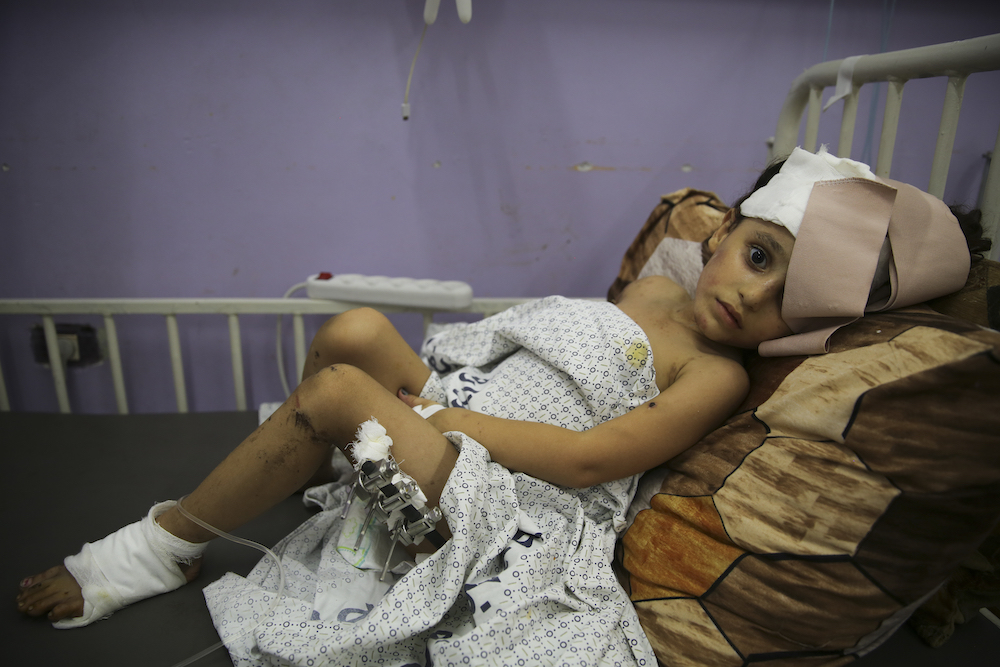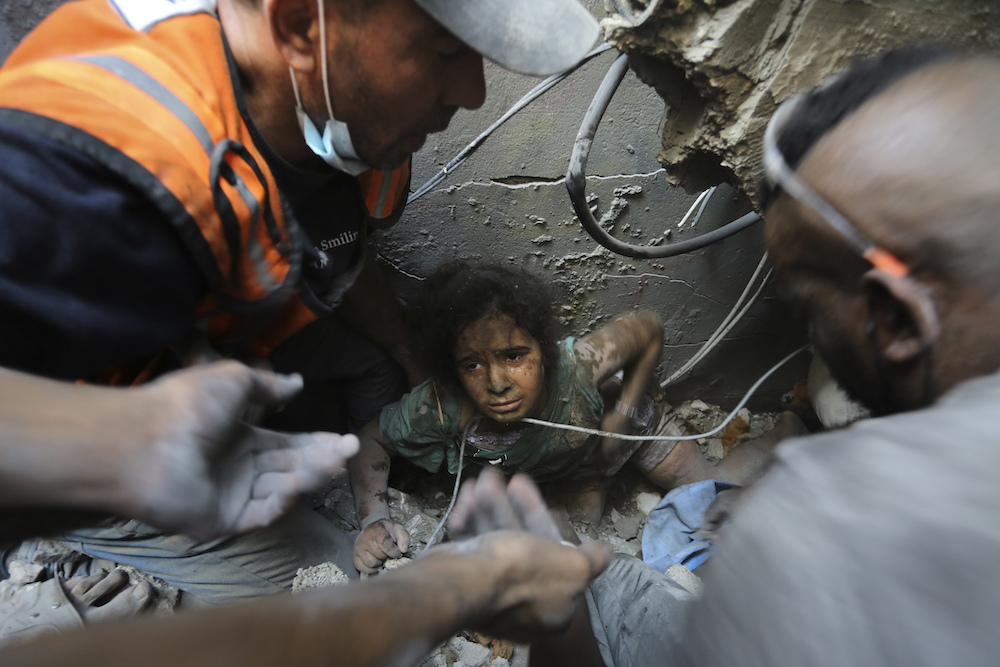DEIR AL-BALAH: More than 3,600 Palestinian children were killed in the first 25 days of the war between Israel and Hamas, according to Gaza’s Hamas-run Health Ministry. They were hit by airstrikes, smashed by misfired rockets, burned by blasts and crushed by buildings, and among them were newborns and toddlers, avid readers, aspiring journalists and boys who thought they’d be safe in a church.
Nearly half of the crowded strip’s 2.3 million inhabitants are under 18, and children account for 40 percent of those killed so far in the war. An Associated Press analysis of Gaza Health Ministry data released last week showed that as of Oct. 26, 2,001 children ages 12 and under had been killed, including 615 who were 3 or younger.
“When houses are destroyed, they collapse on the heads of children,” writer Adam Al-Madhoun said Wednesday as he comforted his 4-year-old daughter Kenzi at the Al Aqsa Martyrs Hospital in the central Gaza city of Deir Al-Balah. She survived an airstrike that ripped off her right arm, crushed her left leg and fractured her skull.

Israel says its airstrikes target Hamas militant sites and infrastructure, and it accuses the group of using civilians as human shields. It also says more than 500 militant rockets have misfired and landed in Gaza, killing an unknown number of Palestinians.
More children have been killed in just over three weeks in Gaza than in all of the world’s conflicts combined in each of the past three years, according to the global charity Save the Children. For example, it said, 2,985 children were killed across two dozen war zones throughout all of last year.
“Gaza has become a graveyard for thousands of children,” said James Elder, a spokesperson for UNICEF, the UN children’s agency.
Images and footage of shell-shocked children being pulled from rubble in Gaza or writhing on dirty hospital gurneys have become commonplace and have fueled protests around the world. Scenes from recent airstrikes included a rescuer cradling a limp toddler in a bloodied white tutu, a bespectacled father shrieking as he clutched his dead child tight to his chest, and a dazed young boy covered in blood and dust staggering alone through the ruins.
“It’s a curse to be a parent in Gaza,” said Ahmed Modawikh, a 40-year-old carpenter from Gaza City whose life was shattered by the death of his 8-year-old daughter during five days of fighting in May.
Israeli children have also been killed. During Hamas’ brutal Oct. 7 rampage across southern Israel that sparked the war, its gunmen killed more than 1,400 people. Among them were babies and other small children, Israeli officials have said, though they haven’t provided exact figures. About 30 children were also among the roughly 240 hostages Hamas took.
As Israeli warplanes pound Gaza, Palestinian children huddle with large families in apartments or UN-run shelters. Although Israel has urged Palestinians to leave northern Gaza for the strip’s south, nowhere in the territory has proven safe from its airstrikes.
“People are running from death only to find death,” said Yasmine Jouda, who lost 68 family members in Oct. 22 airstrikes that razed two four-story buildings in Deir Al-Balah, where they had sought refuge from northern Gaza.
The strike’s only survivor was Jouda’s year-old niece Milissa, whose mother had gone into labor during the attack and was found dead beneath the rubble, the heads of her lifeless twin newborns emerging from her birth canal.
“What did this tiny baby do to deserve a life without any family?” Jouda said.

Palestinians carry a wounded girl after being rescued from under the rubble of buildings that were destroyed by Israeli airstrikes in Jabaliya refugee camp (AP)
Israel blames Hamas for Gaza’s death toll — now more than 8,800, according to Gaza’s Health Ministry — because the militant group operates from jam-packed residential neighborhoods. Palestinians point to the soaring casualty count as proof that Israeli strikes are indiscriminate and disproportionate.
The war has injured more than 7,000 Palestinian children and left many with lifechanging problems, doctors say.
Just before the war, Jouda’s niece Milissa walked a few paces for the first time. She will never walk again. Doctors say the airstrike that killed the girl’s family fractured her spine and paralyzed her from the chest down. Just down the hall from her in the teeming central Gaza hospital, 4-year-old Kenzi woke up screaming, asking what had happened to her missing right arm.
“It will take so much care and work just to get her to the point of having half a normal life,” her father said.
Even those physically unscathed may be scarred by war’s ravages.
For 15-year-olds in Gaza, it’s their fifth Israel-Hamas war since the militant group seized control of the enclave in 2007. All they’ve known is life under a punishing Israeli-Egyptian blockade that prevents them from traveling abroad and crushes their hopes for the future. The strip has a 70 percent youth unemployment rate, according to the World Bank.
“There is no hope for these children to develop careers, improve their standard of living, access better health care and education,” said Ayed Abu Eqtaish, accountability program director for Defense for Children International in the Palestinian territories.
But in this war, he added, “it’s about life and death.”
And in Gaza, death is everywhere.
Here are just a few of the 3,648 Palestinian children and minors who have been killed in the war.

Palestinians try to pull a girl out of the rubble of a building that was destroyed by Israeli airstrikes in Jabaliya refugee camp (AP)
ASEEL HASSAN, 13
Aseel Hassan was an excellent student, said her father, Hazem Bin Saeed. She devoured classical Arabic poetry, memorizing its rigid metric and rhyme scheme, and reveling in its mystical images and florid metaphors. During the war, when Israeli bombardments came so close that their walls shook, she would regale her relatives by reciting famous verses from Abu Al Tayyib Al-Mutanabbi, a 10th-century Iraqi poet, her father said.
“When I asked her what she wanted to do when she grew up, she would say, read,” said 42-year-old Bin Saeed. “Poems were Aseel’s escape.”
An airstrike on Oct. 19 leveled his three-story home in Deir Al-Balah, killing Aseel and her 14-year-old brother, Anas.
MAJD SOURI, 7
The explosions terrified Majd, said his father, 45-year-old Ramez Souri.
He missed playing soccer with his school friends. He was devastated that the war had canceled his Christian family’s much-anticipated trip to Nazareth, the town in Israel where tradition says Jesus grew up.
“Baba, where can we go?” Majd asked again and again when airstrikes roared. The family, devout members of Gaza’s tiny Christian community, finally had an answer — St. Porphyrius Greek Orthodox Church in Gaza City.
Souri said Majd calmed down when they arrived at the church, where dozens of Christian families had taken shelter. Together, they prayed and sang.
On Oct. 20, shrapnel crashed into the monastery, killing 18 people. Among the dead were Majd and his siblings, 9-year-old Julie and 15-year-old Soheil. Israel says it had been targeting a nearby Hamas command center.
Majd was found beneath the rubble with his hands around his mother’s neck. His face was completely burned.
“My children just wanted peace and stability,” said Souri, his voice cracking. “All I cared about was that they were happy.”
KENAN AND NEMAN AL-SHARIF, 18 months
Karam Al-Sharif, an employee with the UN Palestinian refugee agency, could barely speak Wednesday as he knelt over his children’s small shrouded bodies at the hospital. Gone were his daughters, 5-year-old Joud and 10-year-old Tasnim.
Also gone were his twin 18-month-old sons, Kenan and Neman. Al-Sharif sobbed as he hugged Kenan and said goodbye. Neman’s body was still lost beneath the rubble of the six-story tower where the family had sought refuge in the Nuseirat refugee camp, in central Gaza.
“They had no time here,” Sami Abu Sultan, Al-Sharif’s brother, said of the baby boys, a day after the building was destroyed. “It was God’s will.”
MAHMOUD DAHDOUH, 16
On Oct. 25, Al Jazeera’s livestream caught the chilling moment when its Gaza bureau chief, Wael Dahdouh, discovered that an Israeli airstrike had killed his wife, 6-year-old daughter, infant grandson and 16-year-old son, Mahmoud.
Swarmed by TV cameras at the hospital, Dahdouh wept over his teenage son, murmuring, “You wanted to be a journalist.”
Mahmoud was a senior at the secular American International High School in Gaza City. Set on becoming an English-language reporter, he spent his time honing camera skills and posting amateur reporting clips on YouTube, Dahdouh said.
A video that Mahmoud filmed days before he died showed charred cars, dark smoke and flattened homes. He and his sister, Kholoud, took turns delivering a monologue, straining to be heard over the wind.
“This is the fiercest and most violent war we have lived in Gaza,” Mahmoud said, chopping the air with his hands.
At the end of the clip, the siblings stared straight into the camera.
“Help us to stay alive,” they said in unison.



























